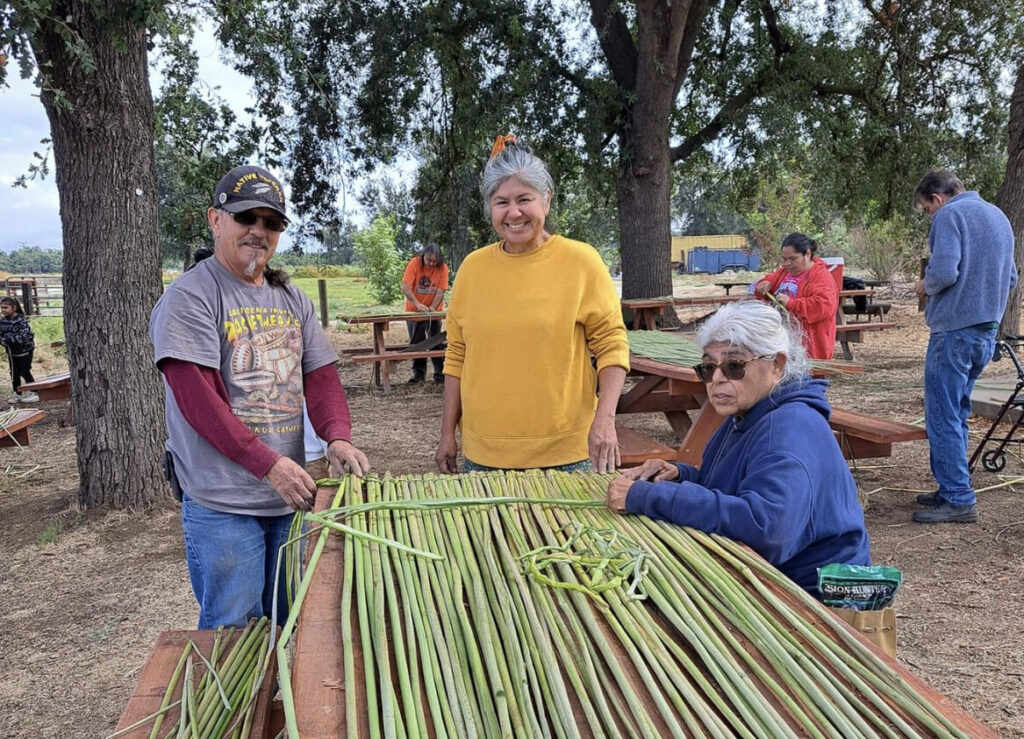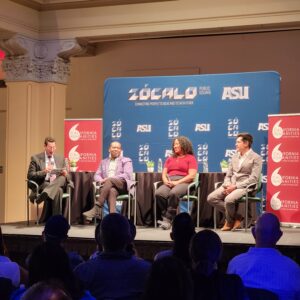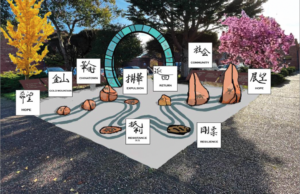In honor of National Native American Heritage Month this November, we are proud to feature several current and upcoming projects that are sharing and celebrating the stories, culture, and traditions of Indigenous Californians. We hope you can join us at these special events, exhibits, and programs, and engage in some of these special multimedia projects online.
Native Voices
Project Director: Lisa Monteiro, Mineral King Preservation Society
When: Ongoing
Where: Mineral King Room, Three Rivers Historical Museum | 42268 Sierra Drive, Three Rivers, CA 93271, FREE admission
After celebrating its opening on October 28, Native Voices is now open at the Three Rivers Historical Museum in Three Rivers, California. This exhibit, supported by a Humanities for All Project Grant, honors and celebrates the diverse cultures, histories, and perspectives of the region’s indigenous community through, artifacts, language, and storytelling.
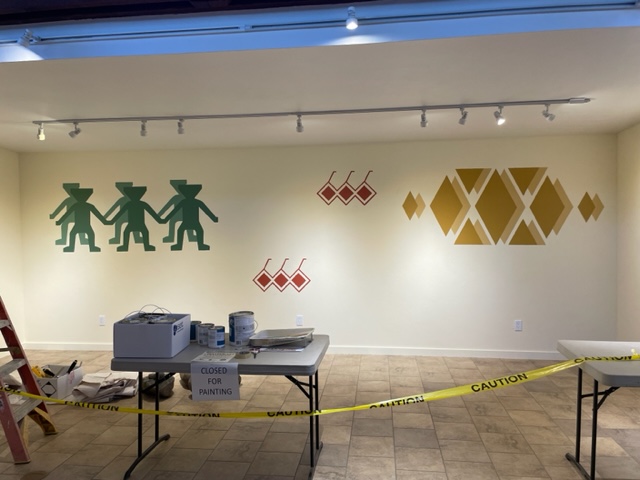
A freshly painted mural completed by local artist Jana Botkin for Native Voices.
Three Rivers Historical Museum
Courtesy of Lisa Monteiro
Volunteers working at the Kaweah Oaks Preserve to weave the tule mats for a housing structure.
Kaweah Oaks Preserve
Courtesy of Lisa Monteiro
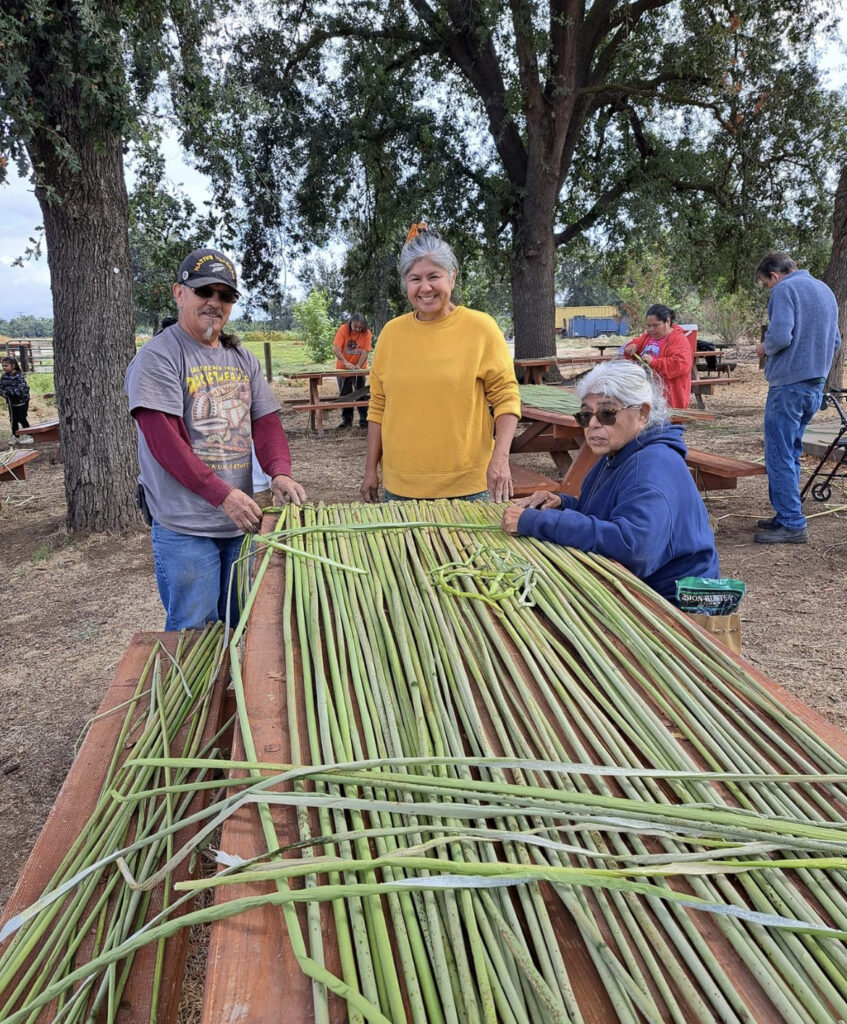
A collaboration with members of the local Yokuts community, the Three Rivers Historical Museum, and the Mineral King Preservation Society, this interpretive exhibit about local Native history will use objects in the museum’s collection, and is informed by the knowledge of the last fluent speaker of Wukchumi of the Tule-Kaweah Yokuts. The exhibit will show how Native peoples traditionally lived and worked the land, how European settlement impacted them, and how they live today.
The museum’s location on the main road into Sequoia National Park will ensure that thousands of visitors will be able to access this free exhibit for years to come.
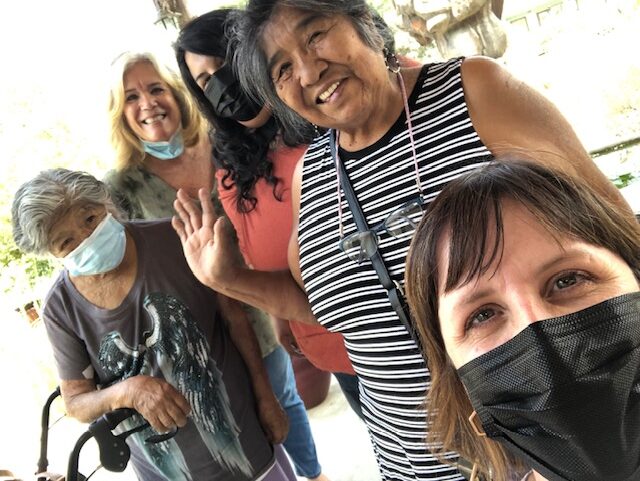
“Our Native Voices exhibit holds immense significance as it endeavors to narrate the profound story of the enduring vitality of native cultures,” said project director and Mineral King Preservation Society Executive Director Lisa Monteiro. “Through its portrayal of native language, the art of basketry, and rich storytelling, this exhibit not only educates visitors about the heritage of our indigenous communities but also emphasizes the crucial message that these communities continue to thrive and make meaningful contributions to society today. Native Voices serves as a poignant reminder that the voices, traditions, and resilience of native people are not relegated to the past but are very much alive in the present. It has been one of the absolute highest honors of my career to work on this project alongside our dedicated committee and inspiring cultural advisors.”
“Native Voices serves as a poignant reminder that the voices, traditions, and resilience of native people are not relegated to the past but are very much alive in the present. It has been one of the absolute highest honors of my career to work on this project alongside our dedicated committee and inspiring cultural advisors.”
– Lisa Monteiro
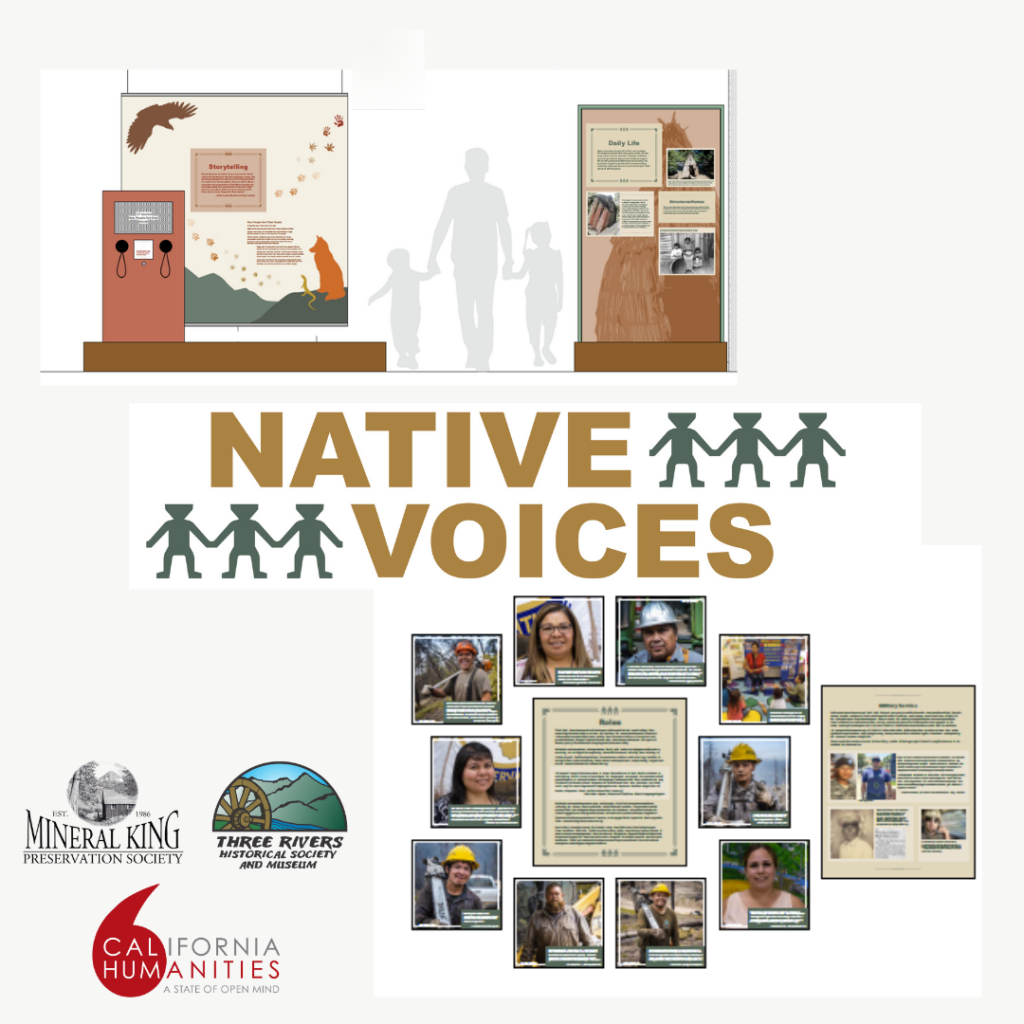
Contemporary Indigenous Voices of California’s South Coast Range
Project Director: Kirti Bassendine
When: October 2-January 7, 2024
Where: de Young Museum, San Francisco, FREE admission
Another current exhibit supported by a Humanities for All Project grant is Contemporary Indigenous Voices of California’s South Coast Range, an exhibition of photography and short films exploring tribes’ land-based culture, cultural restoration, the perspectives of elders and youth, and barriers to cultural expression in the modern world.
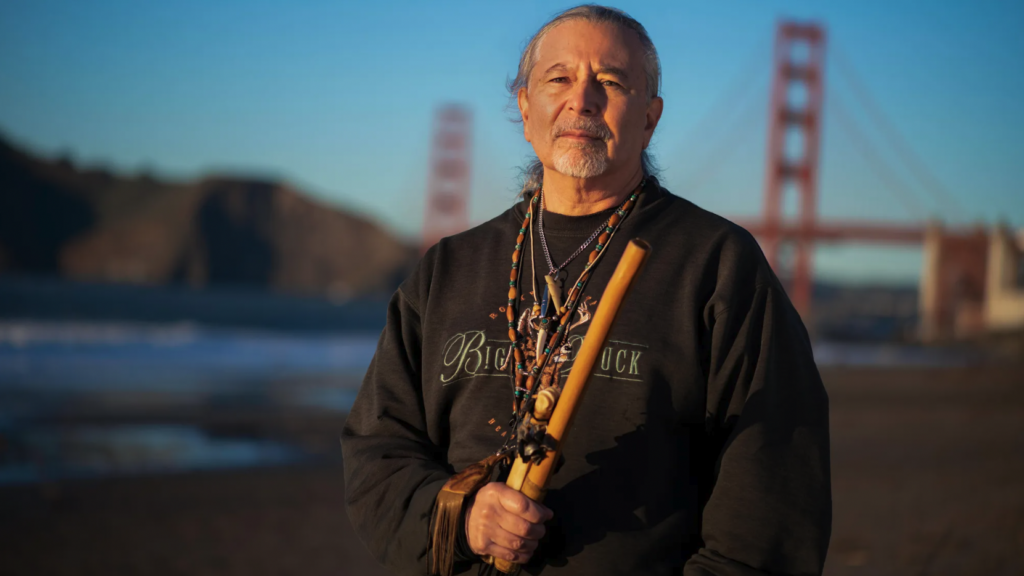
Led by photographer and documentarian Kirti Bassendine, the exhibit features Indigenous community members from the South Coast Range: the San Francisco peninsula through the Santa Cruz mountains, Monterey Bay, and lower Salinan Valley. Bassendine’s photographs are accompanied by powerful personal statements from Native community members calling attention to cultural connections to the land, rematriation (restoring the relationship between Indigenous people and their ancestral land), and climate change.
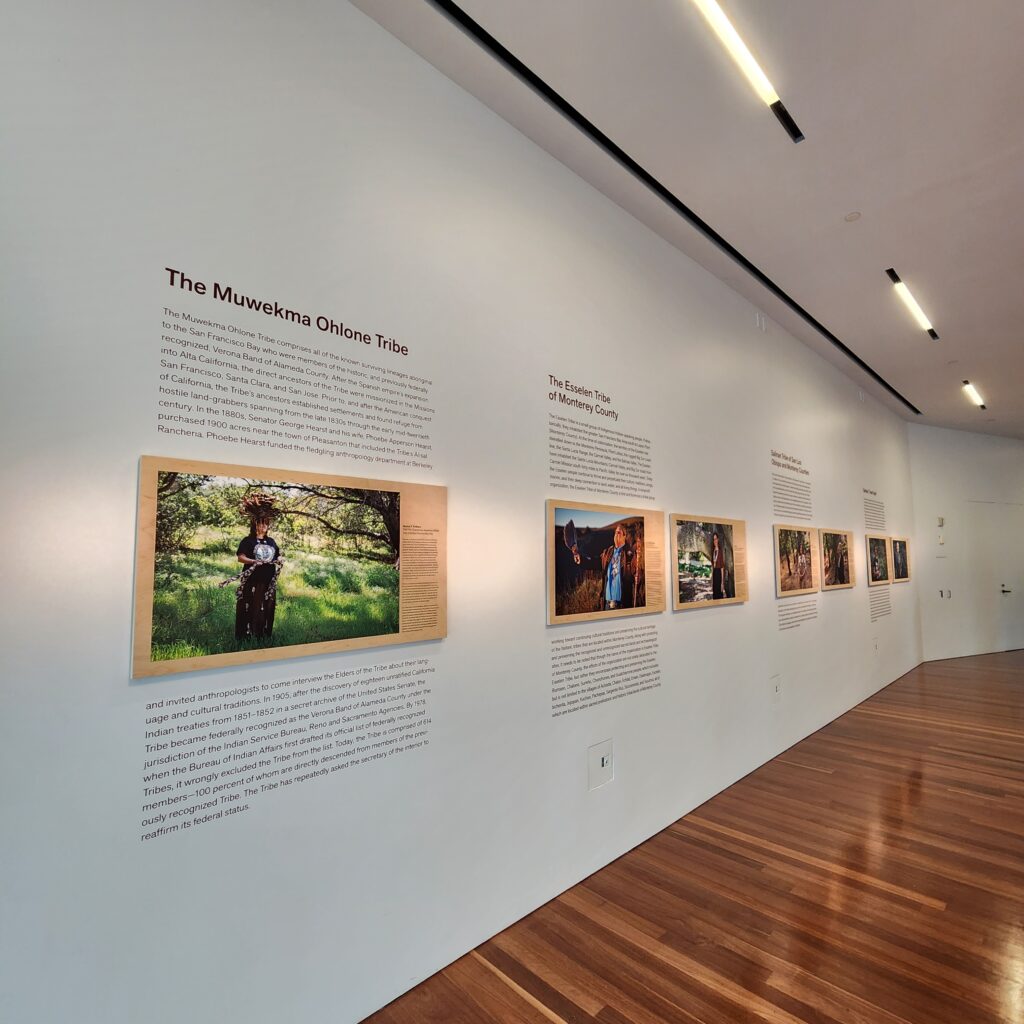
The exhibit had a successful opening day on October 2, with Bassendine reporting many positive responses from the attendees told her how moved they were by the material.
“California Humanities’ invaluable support served as the vital seed funding that allowed Contemporary Indigenous Voices of the South Coast Range to take root and grow,” Bassendine said. “Their belief in this project has not only enabled us to amplify the essential stories of Indigenous communities, but has also paved the way for the profound impact we hope this exhibit will have in fostering greater understanding, appreciation, and support for Indigenous cultures and their vital contributions to our society today.”
The de Young will host another exhibit celebration on November 4, which will include a conversation with artists, cultural leaders, and elders from the Association of Ramaytush Ohlone, Confederated Villages of Lisjan, Esselen Tribe of Monterey County, and Salinan Tribe of San Luis Obispo and Monterey Counties. The discussion will explore real-world examples of rematriation, where title and access is returned to Indigenous communities in California, and guests will be able to participate in cultural demonstrations and activities.
“Their [California Humanities] belief in this project has not only enabled us to amplify the essential stories of Indigenous communities, but has also paved the way for the profound impact we hope this exhibit will have in fostering greater understanding, appreciation, and support for Indigenous cultures and their vital contributions to our society today.”
– Kirti Bassendine
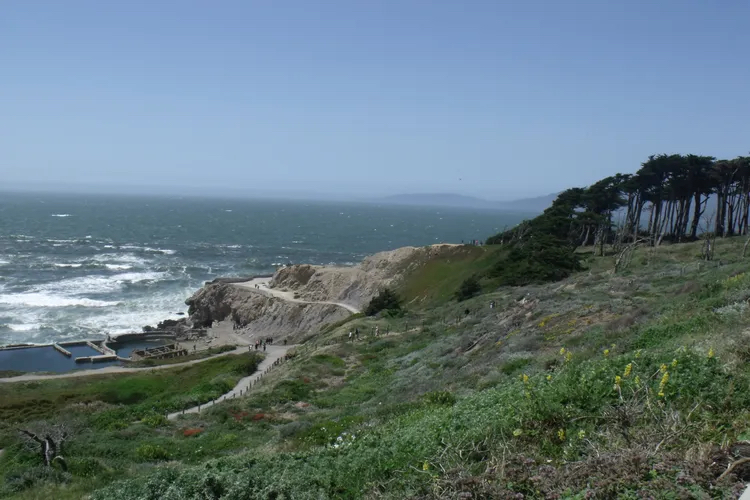
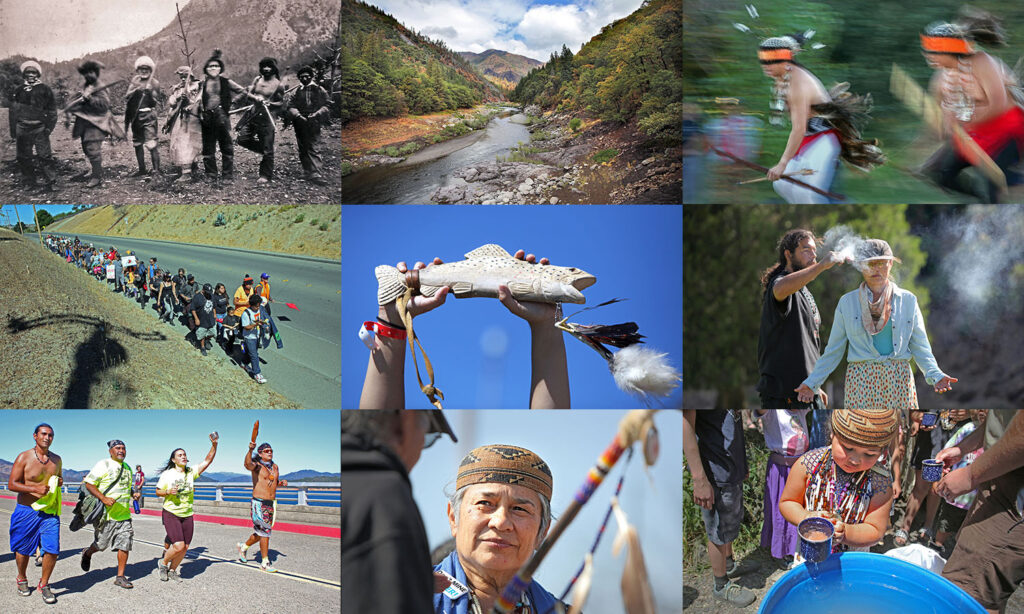
A PRAYER FOR SALMON
Producer and Director: Judy Silber
Sponsor Organization: KALW Public Media
The recipient of a California Documentary Project Production Grant in 2022, A PRAYER FOR SALMON is a new audio documentary series from KALW’s The Spiritual Edge podcast that tells the story of the Winnemem Wintu people and their clash with Northern California’s Shasta Dam. The dam’s construction turned California into an agricultural powerhouse, but it also left the Winnemem Wintu displaced and threatened the survival of the small non-federally recognized tribe and that of the Chinook salmon, to which it has an enduring historical, moral, and spiritual connection. Told through the voices of tribal members and covering ceremonies and protests recorded over years of reporting, the series details their fight to resist a proposed Shasta Dam Enlargement Project and highlights the Winnemem Wintu’s goals of returning Chinook salmon to their homeland on the McCloud River.
AWAKEN
Project Director: Daniel Golding
Also in recognition of Native American Heritage Month we revisit AWAKEN, a short documentary film directed by Nathaniel Golding, 14, and Xavier Madrid, 19, highlighting the cultural lives and experiences of teenagers on the Quechan Nation’s Fort Yuma Reservation in Southern California. AWAKEN tells the story of cousins Orlando Jefferson and Kieran Palone, whose love for heavy metal music has not deterred them from learning their Native American traditional songs and dances. AWAKEN was produced by Daniel Golding and commissioned by California Humanities as part of the YouthDocs series in 2020.
Daniel Golding, Producer:
“The Quechan Nation is one of the largest tribes in California, but few know of its existence because of its isolated location. Also, because of our isolated location, we are still culturally strong. We have approximately 60 fluent speakers of the Quechan language, which is a high number for a California tribe. But this number is also rapidly shrinking as many of the elder speakers are dying.
“Young people are faced with many challenges. Not only the pressures of just being a teenager, but the responsibility to carry on the traditional beliefs. These young men take pride in being able to do both.”
– Daniel Golding
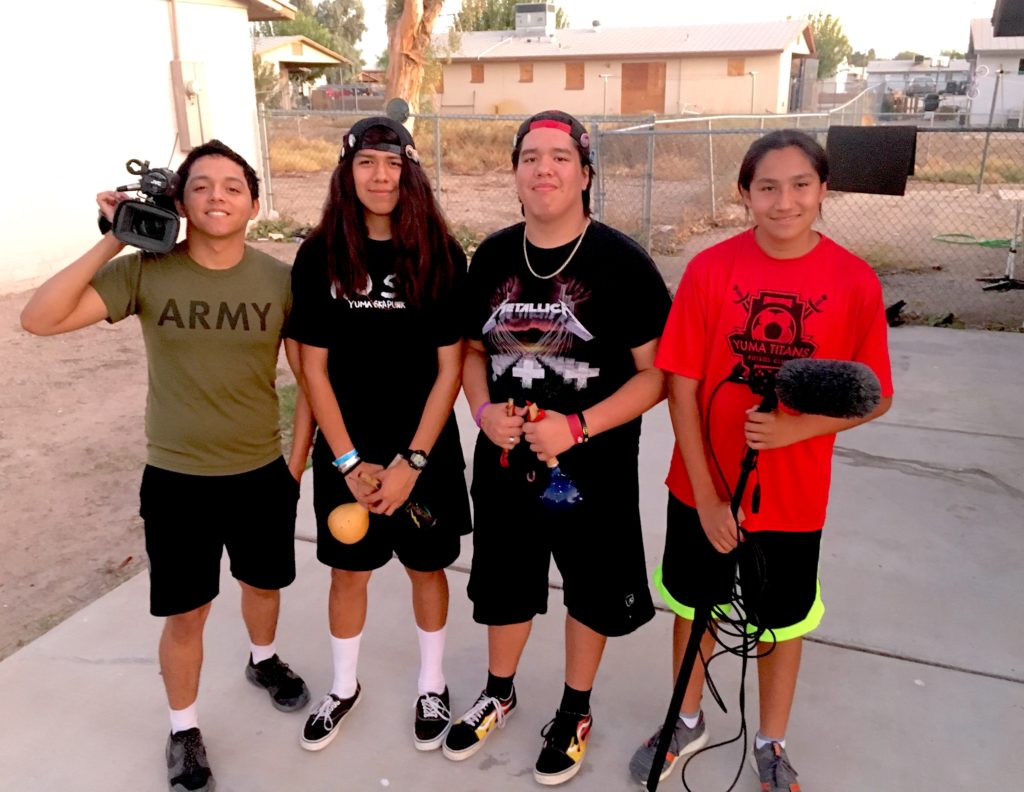
Living on the Fort Yuma Reservation in Southern California isn’t easy. Many of the Quechan youth today aren’t picking up the language or traditions. I think this story is important because it highlights the complexities of Native American youth today. Young people are faced with many challenges. Not only the pressures of just being a teenager, but the responsibility to carry on the traditional beliefs. These young men take pride in being able to do both. Their story serves as an example, showing today’s Native American youth’s strength to proudly live life with one foot in both worlds.”
FIRE TENDER
Project Directors: Roni Jo Draper (Yurok), Marissa Lila
Upcoming Screening: American Indian Film Festival | November 6, 2023 | 12:15 pm PT | San Francisco Public Library
Finally, as part of the annual American Indian Film Festival, on November 6 the San Francisco Public Library will showcase a CDP-supported project, FIRE TENDER. This short documentary amplifies the voices and efforts of Yurok tribal members as they engage in cultural burning and other traditional practices toward ecological, cultural, and spiritual sustenance. The film’s story centers around contemporary Yurok women and their efforts to return Indigenous relationship with fire to the land. FIRE TENDER is about heeding the knowledge of Indigenous lifeways toward healing and nourishing both land and people.
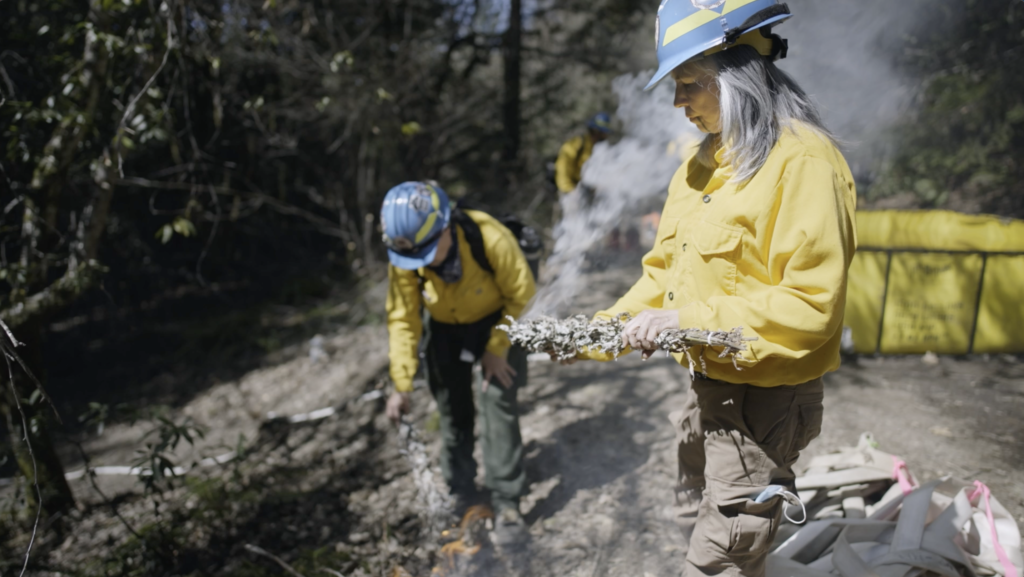
Indigenous Wisdom: Celebrating Our Central Valley Indigenous Elders
Project Director: Ginny Barnes, California State University, Fresno
When: Spring 2024
Where: Fresno State Library, Fresno
Ahead of the Spring 2024 semester, Fresno State Library is working with Fresno State’s Native American student group, faculty, and staff to organize a community dinner and film screening showcasing the life and work of three Central Valley Indigenous elders. Part of the project Indigenous Wisdom: Celebrating Our Central Valley Indigenous Elders, a summer 2023 Humanities for All Quick Grant recipient, the program will provide a space for Indigenous youth, students, and the larger Central Valley community to strengthen community bonds through art, shared experience, and storytelling.
A community dinner welcoming the three elders will be followed by a public screening of short films featuring the elders on topics such as environmental stewardship and Native language preservation.
“Our library is grateful to be in the traditional homelands of the Yokuts and Mono peoples,” said project director Ginny Barnes. “With this effort, we are eager to move beyond symbolic gestures and deepen our allyship for Indigenous justice. Working with the Native community at Fresno State and in the local area to plan these programs, I am looking forward to the conversations that will spark and keep Indigenous knowledge and traditions alive.”
More information will be released soon! Follow Fresno State Library online for event announcements.

